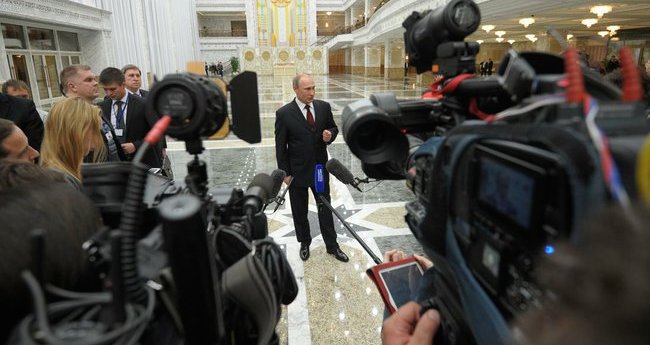
Vladimir Putin speaks to the press at a conference in Minsk, April 29, 2014, Kremlin photo service, public domain.
Over the past two years, the Russian government has armed itself to the teeth with regulatory powers that enable nearly every conceivable form of Internet censorship. In the summer of 2012, the state created a federal registry, where it can blacklist any website or entire web domain for hosting content deemed to be harmful to minors. Earlier this year, the Attorney General gained the right to add to the registry extrajudicially any Web address guilty of encouraging “extremism.” Just this week, on April 29, 2014, the upper house of the parliament passed a series of “anti-terrorist” laws that further expand the authorities’ powers online. After President Putin signs the legislation, anonymous crowd-funding will face stricter regulations, websites like Facebook and Twitter must store data-archives on Russian soil (where the Kremlin can pry more easily), and “popular” bloggers will be registered and subjected to regulations like those imposed on organized mass media.
The RuNet paradox
Today, should the authorities wish to shut down a website or silence an individual blogger, the government has many options. For some reason, however, lawmakers continue to add new powers to the state’s censorship utility-belt, as though the current panoply of Internet controls weren’t enough. In other words, Russian Internet policy is something of a paradox. The parliament keeps passing laws that would pave the way to a wholehearted crackdown, but the scope of actual censorship remains narrow.
Since February, Russia’s Attorney General has added more than a hundred websites to the federal blacklist, including the well-known (but relatively low-trafficked) opposition news portals Grani.ru, Kasparov.ru, and EJ.ru. Additionally, prosectuors have banned several websites belonging to Russia’s most prominent political blogger, Alexey Navalny, who is also under house arrest in the offline world.
There are dozens of more prominent independent websites than the three targeted by the authorities, however, and it’s necessary to study the Kremlin’s wider attack on Navalny, in order to understand why he’s been singled out online. That said, the Russian establishment certainly has not shied from stirring up trouble on the Internet, where Kremlin-friendly oligarchs have interfered with media outlets like Gazeta.ru, Lenta.ru, and DozhdTV, and forced into emigration the creator and CEO of the country’s largest social network. These intrusions on Internet freedom, however, have come in the familiar form of backroom machinations, where meddling shareholders, layoffs, and private phone calls intervene against independent-minded troublemakers.
Yet, despite the apparent reliability of micromanaging the Russian media with traditional pressures, lawmakers this week are signaling their interest in yet another wave of Internet regulations. The new proposals, still in the early development stage, would grant the state powers that are drastic, even in comparison to the recent “anti-terrorism” package.
The Kremlin isn't finished
The first suggestion belongs to Senator Maksim Kavdzharadze, who is calling on Russia to institute its own Internet separate from the United States and Europe. Citing security concerns about Western surveillance, Kavdzharadze warns that “everyone [in Russia] has joined social networks, where they tell where they’ve been and where they’re going.” Kavdzharadze’s proposal has attracted special attention not so much for its outlandishness as what he suggests calling the all-Russian Internet: “Cheburashka,” the name of a beloved Soviet cartoon character. (The next day, clearly unnerved by the public response, the Senator modified his comments to say that he does not support a digital “Iron Curtain.”)
While the public laughed about Kavdzharadze’s dreams of Internet autarky (pausing to visit YouTube and enjoy a few clips of old Soviet animation), Kommersant newspaper published a story about another, seemingly far more serious government initiative. According to the paper’s anonymous sources, a Kremlin working group is drafting new regulations that would grant the state, what reporters describe as, “total control” over the Internet.
The plan would force Internet-providers to use DNS servers located inside Russia, allowing the government to manage the way URL addresses match to IP addresses, making it possible to disrupt the way Internet users access websites. Officials would also institute a tiered system for all online data transfers, barring “local” and “regional” networks from interacting with networks located abroad. At all levels of the Internet, the government intends to “filter content” (though Kommersant’s report does not specify what exactly would be targeted). Finally, the working group proposes transferring the duties of the Coordination Center for the .RU and .РФ domains to an agency inside the Kremlin, laying the foundation for greater state control over what could become privileged domains inside Russia.
All dressed up with nobody to censor?
Last week, Vladimir Putin seemed to endorse the explosion in Internet controls in Russia, telling a group of journalists that the Web “began as a CIA project” and “continues to develop this way.” He also claimed that Yandex, Russia’s leading search engine, faced unfair pressure from Americans and Europeans, when it first emerged, complaining that the company was forced to accept foreigners into its leadership, in order to survive in the tech industry. According to Forbes Russia columnist Leonid Bershidsky, however, Putin’s remarks about Yandex are inaccurate. In fact, Bershidsky says, the Kremlin has bullied Russia’s Internet search giant worst of all.
The Russian government’s accumulation of online censorship tools resembles an arms race. So far, the Kremlin has refrained from unloading its full arsenal on the country’s nearly 100 million Internet users. Yes, there have been isolated attacks on information freedom, as the Attorney General’s persecution of Navalny and several news portals attests, but the RuNet’s general independence survives, for the most part, albeit unsteadily. If this is indeed an arms race, however, the Kremlin might one day soon decide that it’s well enough equipped to snuff out the political threat inherent in a free RuNet.
Should that moment arrive, Russia would become a very different place.



